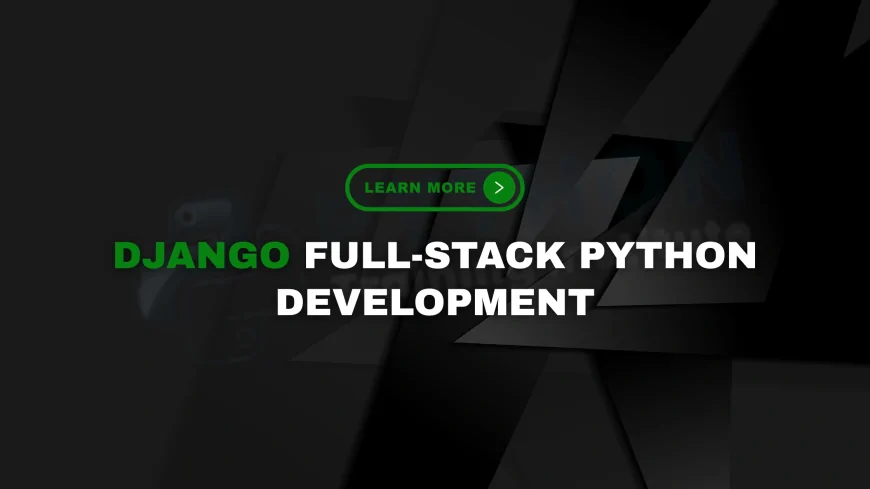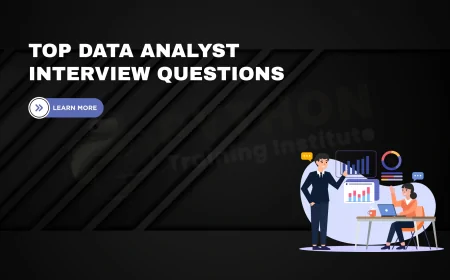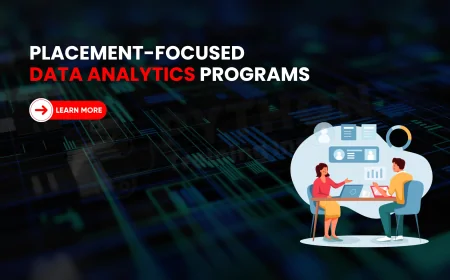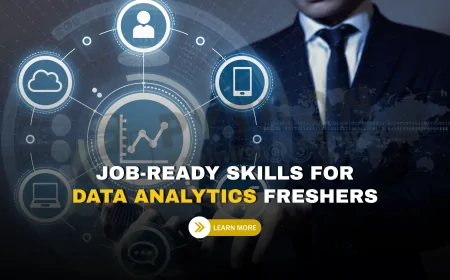Django Full-Stack Python Development Training Pune | Learn Full-Stack Python Development Using Django in Pune
Join expert-led Django full‑stack Python training in Pune. Learn Django, REST APIs, front‑end integration, Docker, CI/CD, real‑world projects, placement support & flexible batches.

Table of Contents
- Introduction
- Why Learn Django Full‑Stack?
- Core Skills Covered
- Pune’s Training Landscape
- Spotlight: WebAsha Technologies
- How to Choose the Right Course
- FAQs
- Conclusion
Introduction
Django, a powerful Python-based web framework, is a gateway for developers to build full-stack applications efficiently. In Pune—a thriving IT and training hub—multiple institutes offer specialized Django full-stack training blending Django’s back-end prowess with front-end technologies, deployment workflows, and practical, project-centered learning.
Why Learn Django Full‑Stack?
Django is a highly efficient, "batteries‑included" Python framework that empowers full‑stack web development with speed, scalability, and security. It significantly accelerates development by providing built‑in modules for handling authentication, ORM-based data models, templating, form validation, and admin interfaces—eliminating the need to build these components from scratch . This structure makes Django ideal for building diverse applications—from CMS and blogs to e‑commerce and social platforms—across both front-end and back-end environments . Django is trusted by major companies and scales efficiently for high-traffic sites, making it well-suited for production workloads . Its strong community and extensive plugin ecosystem offer reusable apps and robust security features out of the box . For developers targeting full-stack or back-end roles—or planning to integrate REST APIs with front-end frameworks—Django provides powerful ORM, structured URL routing, and seamless API integration via Django REST Framework, positioning it as a comprehensive solution for modern web application development .
- Rapid development: Django’s "batteries-included" architecture accelerates building features like authentication, ORM, and templating.
- High demand: Companies in Pune often seek Django developers (e.g., startups, EdTech, automation firms).
- Versatile role: Enables end-to-end development: front-end integration, RESTful APIs, and deployment as a full-stack engineer.
- Real-world applicability: Projects built using Django—such as e-commerce apps, dashboards, internal tools—mirror professional workloads, improving employment readiness.
Core Skills Covered in Training
- Django Basics & MVC (MTV): project setup, models, views, templates, URL routing, static/media handling.
- Front-End Integration: HTML, CSS, Bootstrap, JavaScript/jQuery to build responsive UI components.
- Django REST Framework: Build RESTful APIs with authentication, serializers, and token-based access.
- Database and ORM: CRUD operations, model relations, migrations across MySQL/PostgreSQL.
- Advanced Django: Middleware, custom filters, class-based views, form validation, signals, user roles.
- Deployment & DevOps Basics: WSGI vs ASGI, Docker containers, Git workflow, CI/CD pipelines, deployment using AWS/GCP.
- Testing: Unit tests, integration tests, and automated test coverage in Django apps.
- Real-Time Projects: End-to-end applications like blog CMS, eCommerce, chat applications, API backends.
Pune’s Django Full‑Stack Training Landscape
Pune offers a variety of providers offering full-stack Django training:
- WebAsha Technologies: Python and Django modules embedded in full-stack curriculum, live capstones, placement support :contentReference[oaicite:1]{index=1}.
Spotlight: WebAsha Technologies
- Comprehensive curriculum: Python fundamentals → Django models, views, templates → REST API + Bootstrap/JS integration :contentReference[oaicite:7]{index=7}.
- Live projects: Build full-stack POCs like e-commerce sites, dashboards, CMS—complete with deployment and version control.
- Instructor support: Trainers with 12+ years of Python, Django, and real-world development experience.
- Placement assistance: Proven track record—90%+ placement rate, resume workshops, mock interviews, job portal access.
- Flexible classes: Classroom + live-online, weekend batches, session recordings, and full lab access.
How to Choose the Right Course
Here’s an enhanced guide on How to Choose the Right Django Full‑Stack Python Course, featuring proven criteria and real-world advice to help you decide confidently:
Define Your Learning Goals
-
Your target role: Backend developer? Full-stack engineer? API specialist?
-
Tech depth desired: Strictly Django, or Django with front-end frameworks (e.g., React, Vue)?
-
Career outcomes: Is your aim to build deployable apps, secure REST APIs, or land a job in tech?
Clarifying your objectives ensures you select a course aligned with your path.
Verify Curriculum Coverage
A robust Django full-stack program should include:
-
Django fundamentals (MVC/MTV pattern, models, forms, routing, templates)
-
Front-end tech (HTML, CSS, JavaScript, Bootstrap)
-
Django REST Framework for API development
-
Deployment workflows—Docker, CI/CD, and hosting on platforms like AWS or Heroku
-
Testing (unit and integration) and debugging techniques
Tip: Udemy’s "Full Stack Web Application Development with Django" includes many of these elements and is well-rated.
Prioritize Hands-On Projects
Courses that deliver real, build-from-scratch projects (e.g., blog systems, e-commerce platforms, social media clones) are gold. They help reinforce learning and allow you to showcase real code in portfolios .
Quality of Instruction & Support
-
Choose instructors with real-world Django experience—someone who has built and deployed live applications.
-
Evaluate if the course offers interactive support: Q&A, forums, or live mentoring. Reddit users repeatedly vouch for channels like BugBytes and Corey Schafer for clarity and real support.
Reputation & Up-to-Date Content
-
Follow courses that stay current. For example, Udemy masterclasses last updated in 2023/2024 are typically reliable .
-
Look for courses aligned with Django 4.x+. Redditors recommend projects with modern Django versions or pairing tutorial learning with updated documentation .
Format & Flexibility
-
Decide between self-paced, instructor-led, or hybrid learning models.
-
Course length can vary widely—from an 8-hour Udemy crash course to comprehensive 40+ hour programs .
-
Ensure the course offers recorded lectures, weekend or evening slots, and session flexibility.
Certification & Career Support
-
A market-recognized certificate helps build credibility.
-
Does the course offer career assistance—resume prep, mock interviews, or job connections?
Look for these features to aid your transition into tech roles.
Quick Comparison Table
| Criteria | What to Look For |
|---|---|
| Goal Alignment | Full-stack apps, REST APIs, deployment readiness |
| Curriculum | Django + front-end + API + deployment + testing |
| Projects | Hands-on, end-to-end apps |
| Instructor Quality | Experienced, supportive, proven track record |
| Content Currency | Recent updates, Django 4.x++ |
| Format | Fits your schedule, flexible sessions |
| Certification | Recognized, plus career support |
Step-by-Step Checklist Before Enrolling
-
Identify your end goal—web portal developer, API specialist, or full-stack.
-
Thoroughly review the syllabus, ensuring it includes front-end and deployment components.
-
Check for recent updates and technology currency.
-
Look for project-based learning and confirm they include live coding.
-
Research instructor background and student support features.
-
Confirm delivery flexibility and session recordings.
-
Clarify pricing and career outcomes, including placement help.
-
Explore reviews—platform reviews, Reddit feedback, and testimonials.
The best Django full-stack course is one that matches your goals, keeps current, delivers hands-on projects, supports your learning style, and offers career progression. Start with a solid balance of structure, mentorship, and real work to build a foundation that takes you confidently into full-stack development.
FAQs
1. Do I need prior Python knowledge?
Yes—most courses require Python basics; some offer prep modules before Django.
2. How long does a full-stack Django course last?
Typically 2–4 months (8–20 hrs/week), with part-time and weekend options available.
3. What frameworks are taught?
Core Django, Django REST Framework, Bootstrap/JS integration, sometimes React or Angular modules.
4. Are real-world projects included?
Yes—courses include 2–4 capstones such as e-commerce apps, blog CMS, REST API services.
5. How is deployment covered?
Deployment typically includes Docker, Git, CI/CD integration, and hosting on Heroku/AWS/GCP.
6. Will I learn REST APIs?
Yes—Django REST Framework is often covered to build scalable backend services.
7. What databases will I use?
SQLite used initially; MySQL or PostgreSQL added for production-level training.
8. Do I get placement support?
Yes—all listed providers include resume assistance, mock interviews, and hiring networks.
9. Are certificates recognized?
Certificates from providers like WebAsha, Apponix, and Archers are widely accepted by recruiters.
10. Can I learn online?
Yes—live interactive online and hybrid options are available.
11. Any connect with industry experts?
Many trainers have real-world Python/Django experience and tie-ups with local recruiters.
12. Are tools like Docker and Git included?
Yes—Docker, Git version control, and CI/CD basics are part of the curriculum.
13. What’s the class size?
Typically limited to 15–25 students for better engagement and support.
14. What is the fee range?
Courses cost ₹30k–₹80k, depending on duration, depth, and placement guarantees.
15. Are EMI options available?
Yes—many institutes offer no-cost EMI from ₹3k/mo.
16. What do alumni say?
Students praise the project-first approach and hands-on mentorship at WebAsha, Apponix, and Technogeeks.
17. Can I shift batches?
Most institutes allow batch switching or catch-up sessions if you miss classes.
18. Do they cover testing?
Yes—unit and integration tests are part of the course syllabus.
19. What if my project doesn’t work?
Mentors provide debugging support, code reviews, and iterations until it succeeds.
20. What’s next after Django?
You can move to microservices, deployment automation (DevOps roles), or front-end specialization (React/Vue).
Conclusion
Pune’s Django full-stack training offerings are robust, combining front-end and back-end frameworks with real-world projects and deployment skills. Institutes like WebAsha, Technogeeks, Archer Infotech, and Apponix stand out for their practical, project-focused approaches and placement support. By choosing a course with the right mix of depth, mentorship, flexibility, and job readiness, you can confidently step into a Django Developer role.
What's Your Reaction?
 Like
0
Like
0
 Dislike
0
Dislike
0
 Love
0
Love
0
 Funny
0
Funny
0
 Angry
0
Angry
0
 Sad
0
Sad
0
 Wow
0
Wow
0
















